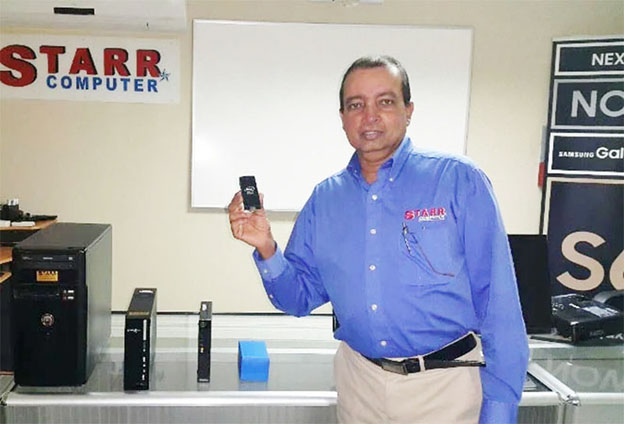Even as Starr Computers’ Chief Executive Officer, Mike Mohan, asserts that his company continues to seek to deepen its footprint in the information technology sector, the United States-based Guyanese businessman had dropped a hint that his company is interested in further investments in what is now the country’s oil-driven economy. Last week the Starr Computers’ boss issued a statement announcing that it had made donations of Smart Labs to the Guyana Police Force Academy and the New Amsterdam Technical Institute in Berbice, gestures which the release describes as amounting to “a significant boost to educational resources within the Berbice community.”
Setting aside its Brickdam complex which continues to market a range of information technology-related inventory, Starr Computers has also evinced a long term interest in supporting the establishment of Smart Laboratories as well as upgrading the information technology resources in local schools. The showroom in the upper flat of the company’s Brickdam complex has frequently played host to groups invited there to experience the company’s info tech inventory. In its release, the company said that the collaborative initiative which resulted in the donations to the institutions in Berbice “has provided the community with essential tools to support its educational framework and enhance vocational skills,” undertakings which he said marked “a milestone in Starr Computers’ commitment to social responsibility.” The company, the release added, was “thrilled to extend our resources and technology to facilitate learning and development in Berbice.”
Evidence of Starr Computers’ continuing interest of investing in Guyana’s growing economy is reflected in ongoing renovation and expansion works to the company’s Brickdam complex where it is expected that other companies will be able to access space for their various entrepreneurial pursuits. While Mohan is yet to disclose specific plans for the expanded complex, it already accommodates a Guyana Telephone Telegraph Company (GTT) facility inside its complex to market its MMG service. When Mohan spoke with Stabroek Business earlier this week, he disclosed his intention to attend the four-day third edition of the Guyana Energy Conference and Supply Chain Expo at the Marriott Hotel which concluded on Thursday.
Meanwhile, Mohan also informed the Stabroek Business of the company’s intention to shortly provide an electric vehicle ‘fueling’ facility to owners of such vehicles once they make a purchase from the Starr complex. While Mohan is yet to disclose the extent of his likely investment in the fast emerging electric vehicles’ industry, the short-term ‘charging’ service which he is offering would appear to point to interest in a longer-term investment in the sector. Statistics on the rapidly emerging electric car industry are likely to have significant implications for the energy sector as estimates seen by the Stabroek Business would appear to point to the likely need for less than 5 million barrels of oil per day by 2030.
Starr Computers may well be dropping a broad hint that it intends to invest in the vehicle sector though he shared no details of such a plan with the Stabroek Business. The Guyanese businessman’s seeming interest in the sector comes on the heels of disclosures that, going forward, electric cars are set to surge to yet another record in 2024, growing their share of the global car market that could take electric cars to one-fifth of the overall market, a circumstance that would result in a major transformation of the auto industry as well as the energy sector, especially oil.
Information contained in the current edition of the International Energy Agency’s (IEA) Annual Global Electric Vehicle Outlook reportedly indicates that sales are expected to grow by another 35% this year to reach 14 million. “Electric vehicles are one of the driving forces in the new global energy economy that is rapidly emerging – and they are bringing about a historic transformation of the car manufacturing industry worldwide,” IEA Executive Director Fatih Birol is quoted as saying. The IEA boss has added that “the trends we are witnessing has significant implications for global oil demand. The internal combustion engine has gone unrivalled for over a century, but electric vehicles are changing the status quo. By 2030, they will avoid the need for at least 5 million barrels a day of oil. Cars are just the first wave: electric buses and trucks will follow soon,” Birol is quoted as saying.
The overwhelming majority of electric car sales to date are mainly concentrated in three markets – China, Europe and the United States. China is the frontrunner, with 60% of global electric car sales taking place there in 2022. Today, more than half of all electric cars on the road worldwide are in China. Europe and the United States, the second and third largest markets, both saw strong growth with sales increasing 15% and 55% respectively in 2022.








